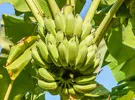 © DreamstimeThis statement is from the banana producers and exporters of Ecuador, Colombia, Guatemala, Honduras, Dominican Republic, and Costa Rica, representing 60 percent of the global banana production.
© DreamstimeThis statement is from the banana producers and exporters of Ecuador, Colombia, Guatemala, Honduras, Dominican Republic, and Costa Rica, representing 60 percent of the global banana production.
In the course of this year, the banana industry in the region has experienced significant cost increases due to the upsurge in prices of key inputs such as fertilizers by 35-45%, cardboard by 30%, plastic by 45%, the loss of production generated by the new maximum residue limits of the destination markets that do not observe the needs and reality of the region’s production, the application of standards imposed by an over-certified market, the adoption of biosecurity measures to prevent R4T FOC, the implementation of security measures to prevent the contamination of containers with illicit substances, and also the generalized increase in the cost of maritime freight by up to 62% due to the global shortage of containers, the structuring of operational alliances between shipping lines and the consolidation of this sector.
These costs have a direct and negative impact on the economic sustainability and competitiveness of the banana industry, which has suffered incalculable damage due to the increasing occurrence of natural phenomena in the region. Also, it has not been spared by effects of the COVID-19 pandemic and must implement all necessary measures to safeguard global food security and protect the health of agricultural workers. While, on the other hand, the price of bananas has undergone in 2021 the most catastrophic decrease in the last 10 years reaching 10 euros per 18.5 kilos as referred by Denis Loeillet, CIRAD researcher, for Reefertrends in the article published on September 01, 2021.
The subsistence and future of the banana industry, on which more than 808,000 families in Latin America directly depend, requires that these externalities are not only borne by the producer-exporter countries, which for an extended period have assumed all the care of the plantations, responsibilities, and other sacrifices necessary to bring bananas to every corner of the world, but that the entire value chain is involved, especially at the other end of it. It is necessary that, within the framework of the concept of shared responsibility, these crucial aspects are discussed to ensure the commitment of all actors to the sustainability of the global banana industry.
For more information:
Juan José Pons
Banana Cluster of Ecuador
Email: [email protected]










